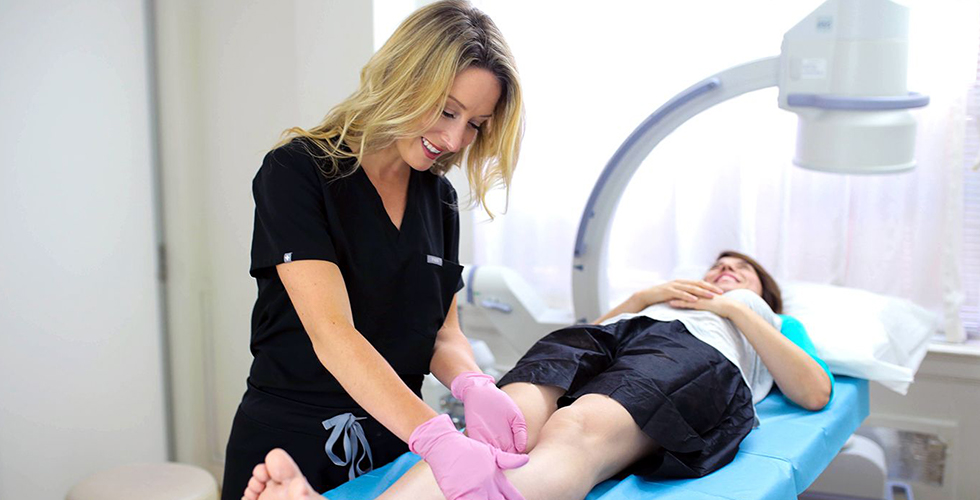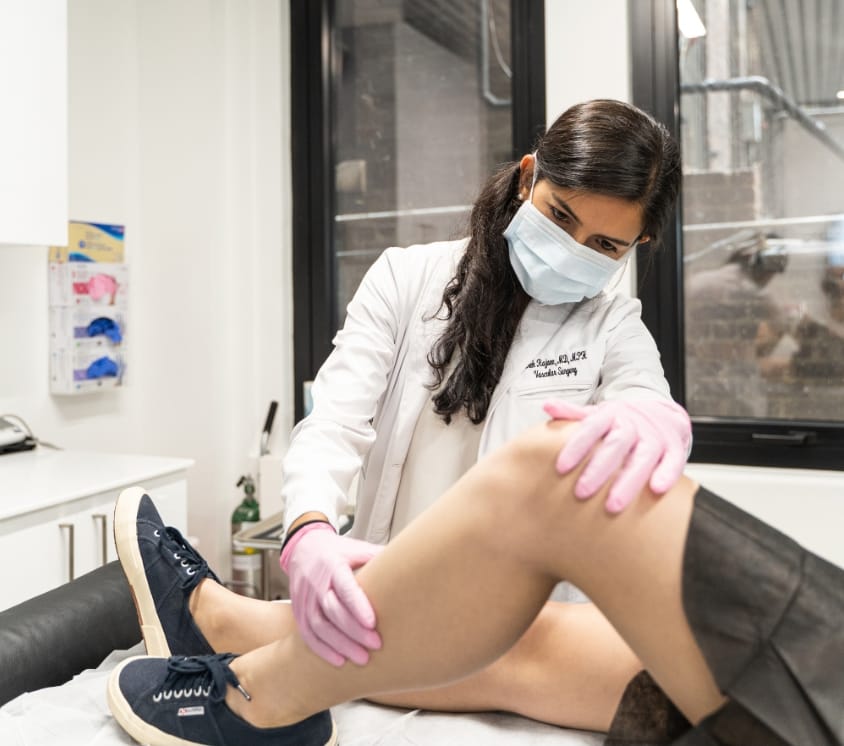The Best Veins Center in Paramus
The Spider Vein and Varicose Vein Treatment Clinic is widely considered the best veins center in Paramus, NJ, led by top spider vein and varicose vein medical directors. Our vein clinic has unanimous 5-star ratings and reviews from all patients because of our comprehensive, personalized, and minimally invasive vein treatment process. Our comprehensive vein care approach ensures optimal results with a negligible risk of recurrence.
We also believe all patients should have accurate information about spider veins and varicose veins. Unfortunately, most of our patients contact vein doctors when they have advanced complications of chronic venous insufficiency, the root cause of most vein problems. That’s because the early signs and symptoms of vein disease are easily mistaken for signs of aging or exhaustion. And most people believe spider veins are cosmetic problems, whereas they can be indicative of underlying vein disease.

To help patients identify and understand vein disease, spider veins, and varicose veins, we answer the most frequently asked questions about vein problems below. You can find our vein treatment clinic at 140 NJ-17 #103, Paramus, a short drive from Paramus Park Mall. You may book an appointment online or call 844-690-1788.
What are spider veins and varicose veins?
Spider veins and varicose veins are essentially damaged blood vessels carrying excessive blood, which makes them appear on the skin’s surface or protrude outwards. Spider veins are dense clusters of reddish or bluish blood vessels visible just underneath the skin, looking like a mass of spider webs. Varicose veins bulge out from the skin, looking like tangled, twisted, and knotted ropes.

What’s the root cause of varicose veins?
Chronic venous insufficiency is the primary root cause of most vein problems, including varicose veins and spider veins. Venous insufficiency is a medical condition wherein your vein valves collapse or malfunction. In healthier veins, the valves act as one-way doors, ensuring smooth blood circulation towards the heart, often against the force of gravity. When your vein valves collapse, blood flows backward and accumulates in the leg veins, leading to spider veins and varicose veins.
Your vein valves may collapse for numerous reasons, such as genetic predisposition, hormonal changes, pregnancy, female sex (estrogen and progesterone increase the risk of vein disease), obesity, or a profession that involves long periods of sitting or standing still, such as driving, nursing, or teaching. These factors contribute to the weakening of vein walls or the accumulation of blood in leg veins, increasing the risk of chronic venous insufficiency.
When should I consult a vascular specialist?
You should consult a vascular specialist or vein doctor if you have the signs or symptoms of vein disease. The earliest signs and symptoms of vein disease are hard to identify because they seem benign and harmless, such as frequent leg cramps, restless leg syndrome, leg pain, and leg swelling. You may soon develop spider veins, and, if left untreated, excessive vascular dilation may lead to varicose veins. You must consult a vein doctor if you notice any of the aforementioned vein problems.
What happens if I don’t seek vein treatment?
If you don’t seek treatment, blood will continue accumulating in your damaged veins, leading to excessive vascular dilation, poor blood circulation, and ineffective wound healing. As varicose veins continue expanding, their walls will weaken, increasing the risk of burst veins, which would lead to profuse bleeding, for which you have to be taken to an emergency room.
Furthermore, the lack of proper blood circulation would lead to skin discoloration and the formation of non-healing wounds (ulcers). The breakdown of blood cells would lead to a patchy, rust-colored formation on your legs. And you may eventually develop blood clots in your leg veins (deep vein thrombosis), which can travel to the lungs and induce a potentially fatal pulmonary embolism.
Can varicose veins go away naturally?
No. Varicose veins can’t go away naturally — in fact, they continue worsening over time. That’s because venous insufficiency is a chronic condition, and blood will continue accumulating in your leg veins, leading to further vascular dilation and varicose veins. The only way to treat varicose veins and vein disease is through minimally invasive treatments performed by reliable vein doctors.
Are compression stockings good for varicose veins?
Yes. Compression stockings are definitely good for varicose veins because they push the accumulated blood towards the heart, alleviating the worse symptoms of vein disease. However, compression stockings can’t treat the damaged vein valves, so they only provide temporary relief. You must contact vein doctors for minimally invasive treatments for long-lasting relief.
What are the best minimally invasive treatments for varicose veins?
Radiofrequency ablation, endovenous laser ablation, and venaseal are widely considered the best minimally invasive treatments for chronic venous insufficiency. During these procedures, the vein doctor will use thermal energy, laser energy, or medical adhesives to destroy or seal the diseased vein’s walls, rerouting the accumulated blood into healthier leg veins.
Next, the vein doctor may use ambulatory phlebectomy to remove superficial varicose veins. This involves the physical extraction of varicose veins through small incisions on the skin’s surface. The vein doctor may also perform sclerotherapy, a procedure wherein a sclerosant solution is injected into spider veins to make them shrink and fade away.
Does sclerotherapy hurt?
Sclerotherapy isn’t painful, but you may experience mild burning and cramping sensations in your legs when the sclerosant solution enters your spider veins. The discomfort is temporary, and you can resume your daily activities and work immediately. There’s no downtime.









